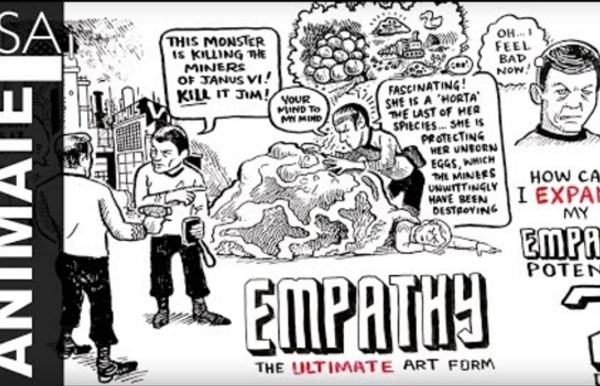



http://www.youtube.com/watch?v=BG46IwVfSu8
Related: WellbeingBoredom Proness Scale Thanks For Visiting! Thank you for taking the BPS. Remember, the quiz is for entertainment purposes only. Scoring high on the scale could be a good thing, depending on your point of view. Just watch that thrillseeking. "Boredom Proness Scale" was created by Rufus Quail of Conquer Boredom! Six Habits of Highly Empathic People If you think you’re hearing the word “empathy” everywhere, you’re right. It’s now on the lips of scientists and business leaders, education experts and political activists. But there is a vital question that few people ask: How can I expand my own empathic potential? Empathy is not just a way to extend the boundaries of your moral universe. According to new research, it’s a habit we can cultivate to improve the quality of our own lives.
This video explains how those plastic bits in face washes, scrubs, and toothpastes can hurt ecosystems By now, most of us know that if we want our consciences to be as squeaky clean as our faces, we have to ditch our most beloved scrubbing products. While microbeads — the tiny plastic bits most commonly found in face washes, scrubs, and toothpastes — might do great things for your pores, they could also quietly wreak havoc on the environment by steadily streaming into the Great Lakes and oceans. Couldn’t care less about fish? Get this: Through the magic of the food chain, these little plastic beads actually carry the potential to come back around and screw with human health.
Emotional Empathy and Cognitive Empathy Chris Allen Thomas Empathy is the ability of people to recognize and respond to the emotions of others. It’s the foundation of both sympathy and compassion. Withoutempathy, sympathy and compassion are more likely to be inaccurate and may lead to increased friction and resentment. This is because the individuals who are the targets of sympathy or compassion have heightened sensitivity to actions that are not based on empathetic understanding. They may feel that actions such as an act of charity or a compassionate word are degrading forms of pity if they are not based on an attempt at understanding the recipient’s reality.
The Simple Way to Give Difficult Feedback (Without Hurting Feelings) Whether you're a leader or a peer, part of your responsibility is to give people feedback. Having been raised in a culture that often dances around the truth and tiptoes near insecurities, you may lack the skills required to balance brutal honesty with a sense of compassion. Think about the feedback you've been given. Chances are, in some of those situations, the feedback was hurtful. Other times, after the initial sting subsided, you learned a great deal about yourself. Study a person character using his/her body Language in almost any situation Here are some great techniques to Read Body Language to Reveal the Underlying Truth in Almost Any Situation. You've likely heard that body language accounts for up to 55% of how we communicate, but reading non-verbal cues isn't just about broad strokes. The same gesture can indicate a number of different things depending on context.
More evidence of Roundup's link to kidney, liver damage ShareThis Scientists report worrisome changes to liver and kidney genes in rats, adding to evidence that a popular herbicide may be toxic August 28, 2015 By Brian Bienkowski Environmental Health News Long-term exposure to tiny amounts of Roundup—thousands of times lower than what is permitted in U.S. drinking water—may lead to serious problems in the liver and kidneys, according to a new study. The study looked at the function of genes in these organs and bolsters a controversial 2012 study that found rats exposed to small amounts of the herbicide Roundup in their drinking water had liver and kidney damage.
The Power of Empathy (and One Surefire to Know if You're Missing It) If someone shares something with you that is incredibly painful and you try to lighten the moment, that may be a lack of empathy. Empathy is about understanding where someone is coming from and caring about them, it says nothing about trying to make someone feel better. The following is a good descriptive cartoon that illuminates the difference between sympathy and empathy from a talk with Brene Brown, author of Daring Greatly The social media problems gripping our girls Posted When 10-year-old Caroline* walked into Dr Michael Carr-Gregg's Melbourne office last year, her body thrummed with anxiety. She and her mother had come to see Dr Carr-Gregg, a child and adolescent psychologist, because the girl had been coerced by a 10-year-old boy at her school into texting him a photograph of her breasts. "He coerced her in a series of six or seven messages, and finally she did," said Dr Carr-Gregg.
How To Use Positive Thinking And Subconscious Mind Power To Improve Your Life Dramatically - Part 2 Be specific and add details to describe your goals You need to be quite specific about your expectations and the more details you can come with, the more focused you become. As we said earlier - when you focus on something, you get more of it. It also helps if you are excited about your goal, if you keep dreaming about it. It creates a very strong and clear message and also opens up your mind for new ideas that would help you achieve it quicker.